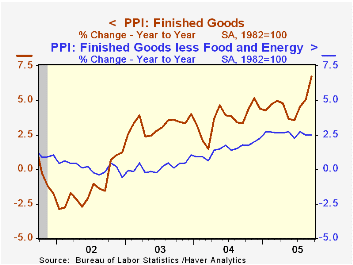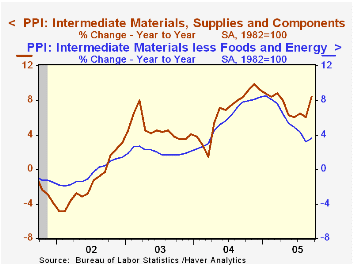 Global| Oct 18 2005
Global| Oct 18 2005September PPI Up 1.9%: Spillover Effects?
by:Tom Moeller
|in:Economy in Brief
Summary
The overall Producer Price Index jumped 1.9% last month, easily surpassing Consensus expectations for a 1.1% increase. The gain was the largest since January 1990 and was led by a 7.1% leap in energy prices which also was the [...]

The overall Producer Price Index jumped 1.9% last month, easily surpassing Consensus expectations for a 1.1% increase. The gain was the largest since January 1990 and was led by a 7.1% leap in energy prices which also was the strongest since 1990.
The so called "core" PPI index is focused on since it provides an indication of the degree to which pressures on energy or food prices may be "spilling over." Finished goods prices less food & energy increased 0.3% in September. The rise beat Consensus expectations for a 0.2% increase and followed no change in prices during the previous month.
And these spillover effects may indeed be now more apparent than earlier for several reasons. 1) The y/y change in core prices held at 2.5%, up from 0.1% and 0.2% during 2002 and 2003, respectively. 2) Prices for core consumer goods rose 0.2% and the y/y gain held at 2.6% versus a 0.1% increase in 2003. 3) Capital equipment prices rose 0.3%. The y/y gain rose to 2.3% from -0.4% during 2002 despite a 22.1% y/y decline in computer prices. That drop was comparable to the 22% and 25% price declines during 2001 and 2002.
Consumer durable goods prices rose 0.4% (+1.5% y/y) led by increases in floor coverings (7.5% y/y), household furniture (3.6% y/y) and jewelry (3.8% y/y). Core consumer nondurable goods prices rose 0.2% (3.6% y/y).
Gasoline prices jumped 12.8% (63.6% y/y) while fuel oil prices surged 11.3% (57.1% y/y). Natural gas prices also posted a strong 8.1% (24.7% y/y) increase and in October the spot gas price has pushed nearly to $14.00/mmbtu, more than double the year ago level.
Intermediate goods prices surged 2.5%, the strongest monthly increase since 1980 while core intermediate goods prices rose 1.2%, the strongest gain since April of last year.
A 16.9% (64.4% y/y) spike in crude energy prices lifted overall crude goods prices by 10.2%.and that pulled the y/y gain to its highest since early 2003. Core crude prices jumped for the third straight month. During the last thirty years "core" crude prices have been a fair indicator of industrial sector activity with a 48% correlation between the six month change in core crude prices and the change in factory sector industrial production.
Federal Reserve Board Chairman Alan Greenspan's speech on Energy is available here.
Inflation Expectations: How The Market Speaks from the Federal Reserve Bank of San Francisco can be found here.
| Producer Price Index | Sept | Aug | Y/Y | 2004 | 2003 | 2002 |
|---|---|---|---|---|---|---|
| Finished Goods | 1.9% | 0.6% | 6.7% | 3.6% | 3.2% | -1.3% |
| Core | 0.3% | 0.0% | 2.5% | 1.5% | 0.2% | 0.1% |
| Intermediate Goods | 2.5% | 0.7% | 8.4% | 6.6% | 4.6% | -1.5% |
| Core | 1.2% | -0.1% | 3.5% | 5.7% | 2.0% | -0.5% |
| Crude Goods | 10.2% | 2.3% | 28.5% | 17.5% | 25.1% | -10.6% |
| Core | 5.3% | 4.6% | 6.5% | 26.6% | 12.4% | 3.8% |
Tom Moeller
AuthorMore in Author Profile »Prior to joining Haver Analytics in 2000, Mr. Moeller worked as the Economist at Chancellor Capital Management from 1985 to 1999. There, he developed comprehensive economic forecasts and interpreted economic data for equity and fixed income portfolio managers. Also at Chancellor, Mr. Moeller worked as an equity analyst and was responsible for researching and rating companies in the economically sensitive automobile and housing industries for investment in Chancellor’s equity portfolio. Prior to joining Chancellor, Mr. Moeller was an Economist at Citibank from 1979 to 1984. He also analyzed pricing behavior in the metals industry for the Council on Wage and Price Stability in Washington, D.C. In 1999, Mr. Moeller received the award for most accurate forecast from the Forecasters' Club of New York. From 1990 to 1992 he was President of the New York Association for Business Economists. Mr. Moeller earned an M.B.A. in Finance from Fordham University, where he graduated in 1987. He holds a Bachelor of Arts in Economics from George Washington University.
More Economy in Brief
 Global| Feb 05 2026
Global| Feb 05 2026Charts of the Week: Balanced Policy, Resilient Data and AI Narratives
by:Andrew Cates






